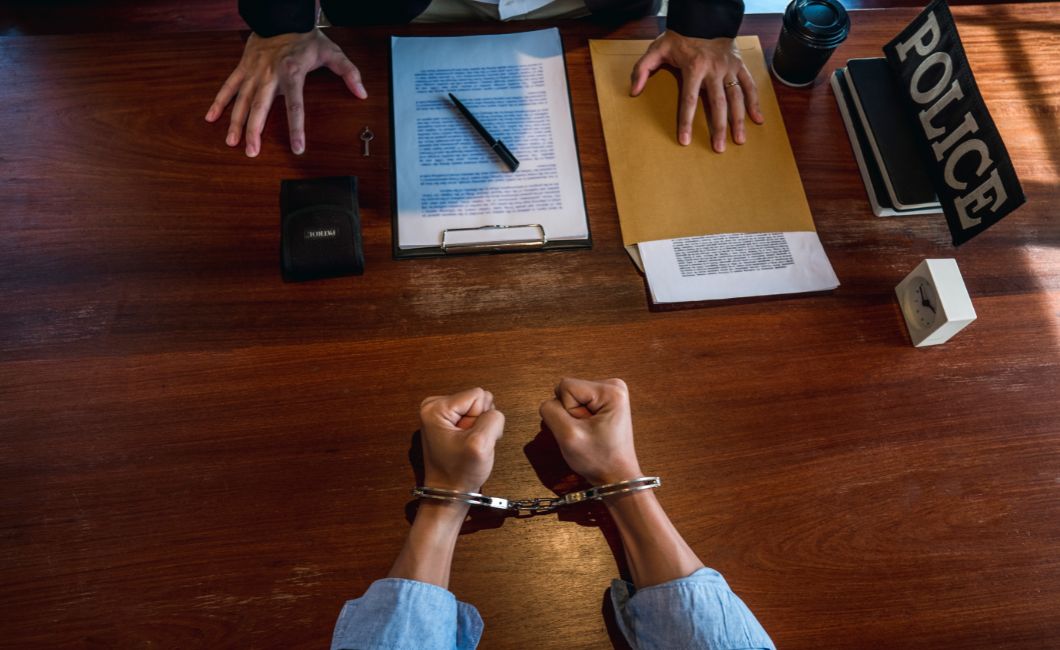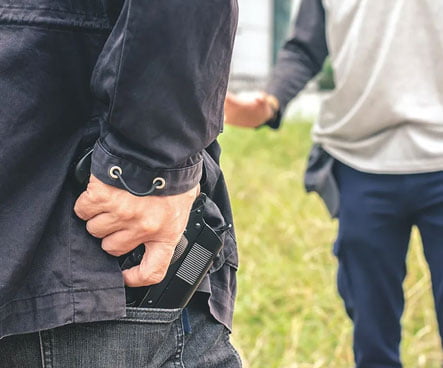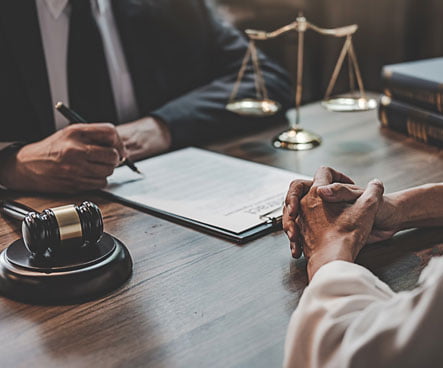Marietta Criminal Defense Lawyer

Marietta Criminal Defense Attorney
If you have been charged with a crime, you need a defense attorney with the experience to manage your case strategically and aggressively. For a crime in Marietta, you need a Marietta criminal defense lawyer with the legal instincts, experience, and familiarity with Georgia law to effectively represent you and defend your rights.
The Law Office of Lawrence J. Zimmerman has the experience and knowledge to better the outcome of your case. For more than 25 years, Lawrence J. Zimmerman has represented clients who have been accused of serious crimes that range from rape to murder. He has also been successful in appellate court, frequently reversing the convictions of clients. His seasoned career has given him the qualities necessary to effectively represent you as well.
Meet Your Marietta Criminal Defense Attorney – Lawrence Zimmerman
Founding Attorney, Zimmerman & Associates
Lawrence Zimmerman is a highly respected criminal defense attorney based in Marietta, Georgia, with over 25 years of experience representing clients in state and federal courts. He is known for his dedication to protecting the rights of the accused and has handled a wide range of cases, from complex felonies to high-profile criminal matters.
Lawrence is a frequent legal commentator in the media and has served as President of the Georgia Association of Criminal Defense Lawyers. He is an active member of the State Bar of Georgia. (1998 to present)
Criminal Charges
When you are charged with a crime in Marietta, Georgia, it is either a felony or misdemeanor charge. Misdemeanors are typically punishable by prison or jail time from one to 12 months. Felonies, however, are much more serious. Capital felonies include crimes such as murder, kidnapping, rape, and armed robbery. Convictions for any of these felonies will result in much longer prison terms, including life in prison or the death penalty for charges such as murder.
Some crimes that would typically be a misdemeanor may result in a felony due to the amount of money or property involved. For example, a shoplifting charge is a misdemeanor unless the property stolen equals more than $300. In that case, it becomes a felony. The number of times that someone has been convicted of the same crime may also increase the sentence when it would otherwise be a minimal penalty.
Below are some areas of criminal law that a Marietta criminal defense lawyer often represents, and many of these categories overlap each other.
Drug Crimes
Some less severe drug charges, such as misdemeanor marijuana possession, are resolved with probation and fines. However, there is always a risk of incarceration for drug crimes because, whether they are state or federal offenses, they are almost always aggressively prosecuted. Many crimes, like drug trafficking, are in federal jurisdiction. Some examples of drug crimes are listed below.
- Intent to distribute
- Manufacturing
- Possession of paraphernalia
- Marijuana cultivation
- Prescription drug fraud
Property Crimes
Property crimes can result in misdemeanor or felony charges, depending on the circumstances of the offense. Charges for property crimes may carry a sentence of incarceration if the defendant is convicted, especially for more serious property crimes. Minor property crimes with less severe consequences include:
- Car hopping
- Minor shoplifting
- Tagging
- Minor vandalism
- Petty theft
More serious property crimes involve the following:
- Arson
- Bank fraud
- Car theft
- Larceny
- Burglary
- Buying or receiving stolen property
- Unlawful entry of someone’s property
- Criminal trespassing
- Destruction of property
- Counterfeiting
- Credit card fraud
- Theft by deception
- Employee theft
- Identity theft
Gun Crimes
Federal agencies, such as the ATF, the FBI, ICE, DHS, and U.S. Marshals, are much more aggressive when pursuing even the most remotely suspicious illegal gun activity. Oftentimes, there are harsh penalties handed down for gun-related crimes like gun trafficking, illegal gun sales, and the use of a firearm while committing a felony.
Firearm charges can be both misdemeanor or felony charges, and they often cross over state lines, making them federal offenses. Anyone charged with gun crimes in Georgia needs an aggressive Marietta criminal defense lawyer with experience in weapons charges defense.
Some specific types of crimes involving guns and other weapons include:
- Brandishing a weapon
- Possession of a firearm by a convicted felon
- Possession of unlawful silencers for firearms
- Unlawful discharge of a firearm
- Possession of stolen firearms
- Illegal possession of explosives
- Pointing a firearm at someone
- Possession of materials to make a bomb
- Carrying a firearm near a school
- Firing a firearm from a motor vehicle
- Firing a firearm from across the highway
Violent Crimes
Whether a violent crime charge is state or federal, it is almost always aggressively prosecuted. For many of these, a conviction requires at least 90% of the sentence to be served. In fact, Georgia’s “Seven Deadly Sins” crimes are all felony charges, and convictions require a minimum 10-year sentence without parole. These offenses include the following:
- Murder
- Rape
- Aggravated sodomy
- Aggravated child molestation
- Aggravated sexual battery
- Armed robbery
- Kidnapping
Other charges considered to be violent crimes include the following:
- Manslaughter
- Aggravated assault
- Domestic violence
- Carjacking
- Home invasion
Sex Crimes
There are a number of crimes that fall under this category, and a conviction for a sex crime requires registration as a sex offender. These are extremely serious crimes, and a conviction carries long-lasting penalties and consequences. Unfortunately, these crimes are often taken advantage of, and many individuals are wrongly accused of sexual misconduct and other sex crimes as a means to get revenge on someone. Sex crimes in Georgia include the following:
- Prostitution/pimping
- Solicitation/pandering
- Child molestation
- Child pornography
- Enticing a child for purposes that are indecent
- Sodomy
- Peeping
- Public indecency
- Sexual assault
- Sexual battery
- Bestiality
Internet Crimes
Cybercrime law enforcement units seek out online criminals who engage in various internet offenses. These crimes often fall under federal jurisdiction, as they involve offenses in multiple states and violate federal laws. Many are carried out on specific websites, like Craigslist. Some examples of internet crimes are below.
- Online prostitution
- Online solicitation of prostitution
- Identity theft
- Email fraud
- Illegal online gambling
- Cyber extortion
- Cyber espionage
- Ransomware attacks
- Crypto-jacking
- Credit card fraud
- Cyberstalking
- Cyberbullying
- Cyberterrorism
- Consumer fraud
- Wire fraud
- Social media crimes
- Computer hacking
- Distribution of child pornography
- Computer crimes against children
White Collar Crimes
White collar crimes involve unethical and illegal behavior that, while non-violent, results in someone’s financial gain through criminal activity. The consequences of these crimes depend on the severity of the crime, the scope of the financial gain, and whether they are state or federal charges. Penalties can range from fines to harsh, long-term prison sentences. Some examples of the most common white collar crimes include:
- Extortion
- Bribery
- Embezzlement
- Public corruption
Federal Crimes
There are several crimes that fall under federal jurisdiction, and these are serious charges because the government that backs the prosecution has unlimited resources. Whether you are being charged or under investigation by a criminal justice department, consulting with a federal crimes defense lawyer is imperative. Some examples of federal crimes are:
- Racketeering (RICO)
- Money laundering
- Government fraud
- Federal drug trafficking
- Federal conspiracy
- PPP loan fraud
- Bank or wire fraud
- Mortgage fraud
- Federal bank robbery
- Counterfeiting
- Terrorism
- Tax evasion
- Embezzlement
- Insider trading
Marietta Crime By Population 2015-2020
| CRIME | 2015 | 2016 | 2017 | 2018 | 2019 | 2020 | Total | Average 6 Year | 2020 Percent +/- 6 Year Average |
|---|---|---|---|---|---|---|---|---|---|
| Murder | 8 | 2 | 6 | 5 | 2 | 4 | 27 | 4.50 | -11% |
| Rape | 33 | 31 | 35 | 47 | 33 | 18 | 197 | 32.83 | -45% |
| Robbery | 126 | 109 | 99 | 72 | 82 | 67 | 555 | 92.50 | -28% |
| Aggravated Assault | 116 | 108 | 112 | 118 | 141 | 150 | 745 | 124.17 | 21% |
| VIOLENT CRIMES TOTAL | 283 | 250 | 252 | 242 | 258 | 239 | 1524 | 254.00 | -6% |
| Burglary | 351 | 312 | 330 | 227 | 217 | 178 | 1615 | 269.17 | -34% |
| Larceny Offenses | 1948 | 1825 | 1710 | 1569 | 1543 | 1403 | 9998 | 1666.33 | -16% |
| Motor Vehicle Theft | 158 | 152 | 174 | 166 | 181 | 180 | 1011 | 168.50 | 7% |
| PROPERTY CRIMES TOTAL | 2457 | 2289 | 2214 | 1962 | 1941 | 1761 | 12624 | 2104.00 | -16% |
Marietta Police Crime by Population 2015-2020 (mariettaga.gov)
Marietta Criminal Defense Strategies
Criminal law in Georgia encompasses a wide range of crimes, from white collar crimes to drug crimes to murder. There are a number of different approaches and defense strategies that a defense lawyer may recommend for handling your case. Below are some of the most common defense strategies used in criminal defense cases.
Pleading Innocent
Possibly the simplest defense strategy to avoid criminal liability, pleading innocent is an effective defense strategy when the defendant did not commit the crime they are being charged with. While pleading innocent offers the opportunity for the defense to present documents, evidence in support of innocence, and testimony by the defendant, there is nothing for the defense to prove, per se. It is the prosecution’s responsibility to prove beyond all reasonable doubt that the defendant committed the crime.
Violation of Constitutional Rights
Sometimes, amid legal proceedings, law enforcement does not follow the law in arresting or registering charges against a defendant. If this can be proved, it means that a violation of the defendant’s constitutional rights occurred, which is a valid reason for the dismissal of certain evidence or the case entirely. An example of a violation of constitutional rights would be an illegal search and seizure of a car or law enforcement entering a property without a warrant.
Alibi
When a criminal defendant has an alibi, it means that the defense can prove that the defendant was somewhere else rather than at the crime scene when the crime was committed. This defense requires substantial and tangible evidence to support an alibi acquittal.
An example of evidence of an alibi might include:
- Testimony by someone who was with the defendant at the time of the crime
- Receipts showing that the defendant was at a store, restaurant, sporting event, concert, or movie theater at the time of the crime
- Phone records that place the defendant’s whereabouts during the crime
Involuntary Intoxication
An involuntary intoxication plea is a lack of intent defense, meaning that the defendant was not aware of what was happening, as they were committing a crime due to intoxication. They must also have become intoxicated without their knowing it.
Voluntary Intoxication
This defense applies when the defendant became intoxicated or high deliberately and then committed the crime. This defense alone is not a valid one, but, in some cases, if the prosecution cannot prove beyond a reasonable doubt that the crime was committed intentionally and the defendant intended the consequences to occur, it may be an effective defense strategy to at least reduce charges or sentencing.
Mistaken Reality
This can apply when a defendant does not realize that the act they were committing was necessarily illegal. In other words, the defense must prove that the defendant believed that they were not committing any crime. An example would be if a defendant is charged with stealing a car when they believed that they were allowed to use the car.
Necessity
This is akin to a defense-of-self or defense-of-others strategy For this to work, the defense must prove that the crime was committed out of a necessity to keep another, more catastrophic event from occurring. For instance, the defendant stole money to pay for their family’s gas bill in the winter.
Duress
This defense requires the defense to prove that there was a threat or force that made the defendant commit the crime that they are charged with. This is also referred to as coercion.
Withdrawal
If a defendant withdrew from committing the crime and did not participate in it, this can be an effective defense, especially if the defense can prove that the defendant notified law enforcement of the crime and did not have any direct participation in the crime.
Entrapment
If law enforcement provoked the defendant to commit a crime that they would not have ordinarily committed, the defense can plead entrapment.
Consent
If the victim gave the defendant consent to commit the crime in question, and it can be proven beyond a reasonable doubt, the consent defense strategy can be legitimate.
FAQs About Marietta, GA Criminal Defense Law
How Much Does a Criminal Defense Lawyer Cost in Marietta, GA?
The average criminal defense attorney in Georgia costs anywhere between $150 and $500 per hour, depending on the severity of the charges. A simple misdemeanor criminal case could cost about $2,000, while a more complicated felony charge could cost up to $100,000.
An attorney’s fees are also dependent on the experience and location of the attorney. More seasoned attorneys in more high-cost areas will have higher fees than inexperienced attorneys or those who operate in lower-cost areas.
How Long Do They Have to Indict You in Marietta, GA?
In Georgia, criminal charges for misdemeanors must be brought against an individual within two years of the date when the alleged crime took place. For a felony charge, this timeline extends to four years. An experienced attorney can help you determine the exact statute of limitations for your specific case, including whether the prosecution can still file charges at all.
What Is a Defense Attorney?
A defense attorney represents a defendant who is being criminally prosecuted. The defense attorney’s role is to defend the rights of their client throughout their legal proceedings. They can help defend their clients in a variety of ways, including through:
- Case investigations
- Pre-trial motions
- Plea negotiations (when applicable and advisable)
- Advocacy during the trial
- Sentencing (when necessary)
- Appeals
How Long Can You Be Held in Jail Without Being Charged in Marietta, GA?
In some cases, law enforcement officers may feel that they can gather additional evidence or information and, thus, hold off on filing formal changes. By law, though, the prosecutor must file formal charges within 72 hours for warrant arrests and 48 hours for warrantless arrests. Before this happens, you should contact your attorney to guarantee your rights while the prosecution builds its case.
Hiring a Marietta Criminal Defense Lawyer
If you are facing criminal charges in Marietta for any of the misdemeanor or felony crimes listed here, you need a Marietta criminal defense lawyer. Your case can vastly benefit from the aid of an experienced criminal defense attorney. The Law Office of Lawrence J. Zimmerman can provide you with the legal representation you need, whether in criminal or juvenile court.
Our firm has extensive experience in Marietta courts and has an excellent success record for the overall outcomes of our clients’ cases. Contact The Law Office of Lawrence J. Zimmerman to learn how our legal services can help your case.
Serving Marietta and the Surrounding Cobb County Area
If you’re facing criminal charges in Marietta or nearby communities, our experienced criminal defense team is here to protect your rights and future. We understand the serious legal, professional, and personal consequences of being investigated or charged with offenses ranging from DUI to theft, drug crimes, or violent offenses.
Located in the heart of Cobb County, our firm is deeply familiar with the local court systems, including the Cobb County Superior Court and State Court in Marietta. We offer strategic, local defense for individuals, families, and professionals facing criminal allegations throughout the region.
Whether you’re under investigation or already charged, acting quickly with a Marietta criminal defense lawyer who knows the local legal landscape can make all the difference. Notably, Georgia’s “First Offender Act” (O.C.G.A. § 42-8-60) may allow eligible first-time offenders in Marietta to avoid a conviction on their record if they successfully complete their sentence, providing a valuable second chance.
Law Office of Lawrence J. Zimmerman – Marietta, GA Office
269 Roswell Street NE,
Third Floor, Marietta,
GA 30060, United States
Office Location
Meet With A Lawyer
Schedule A Consultation
Fields Marked With An “*” Are Required










